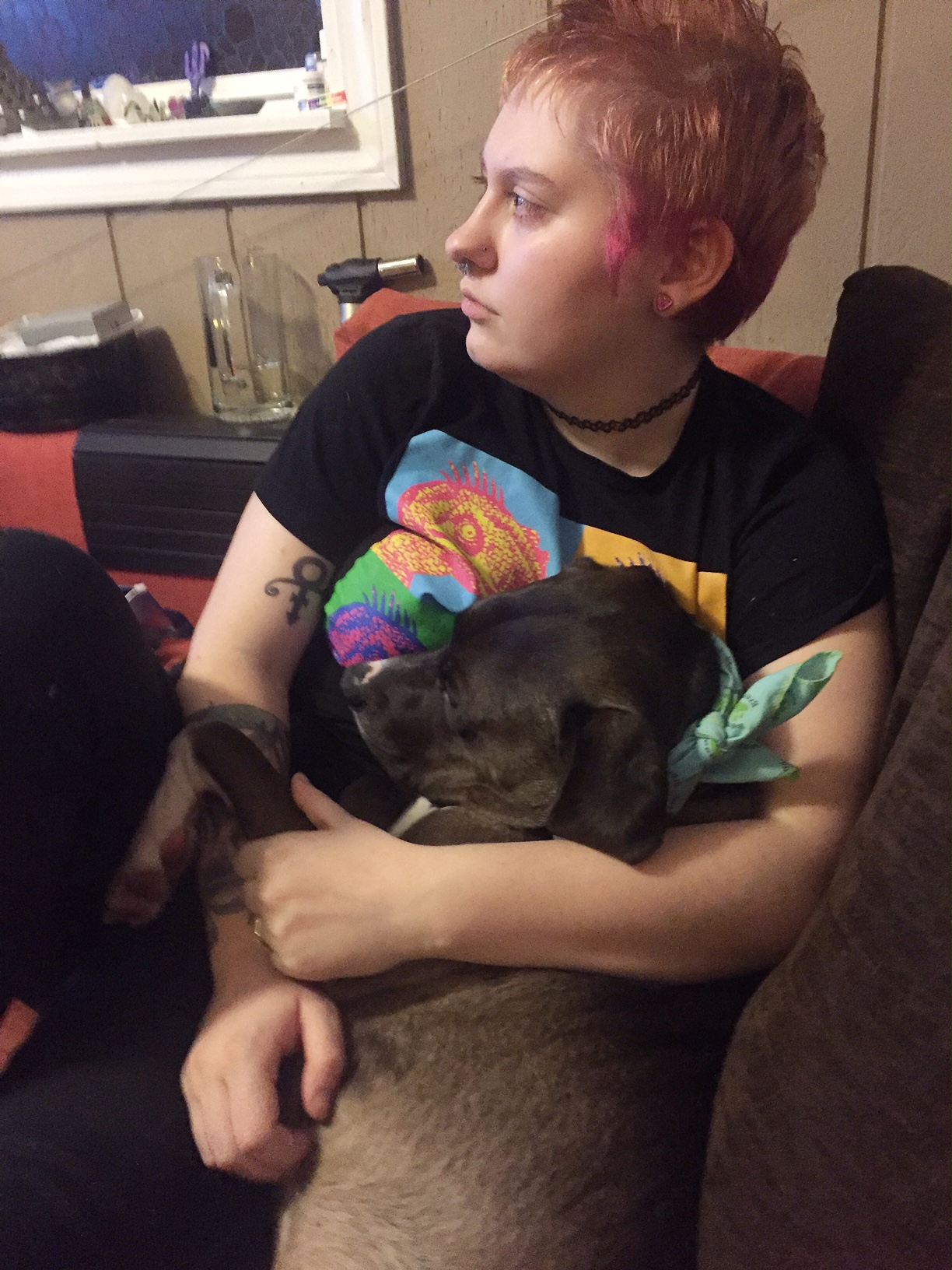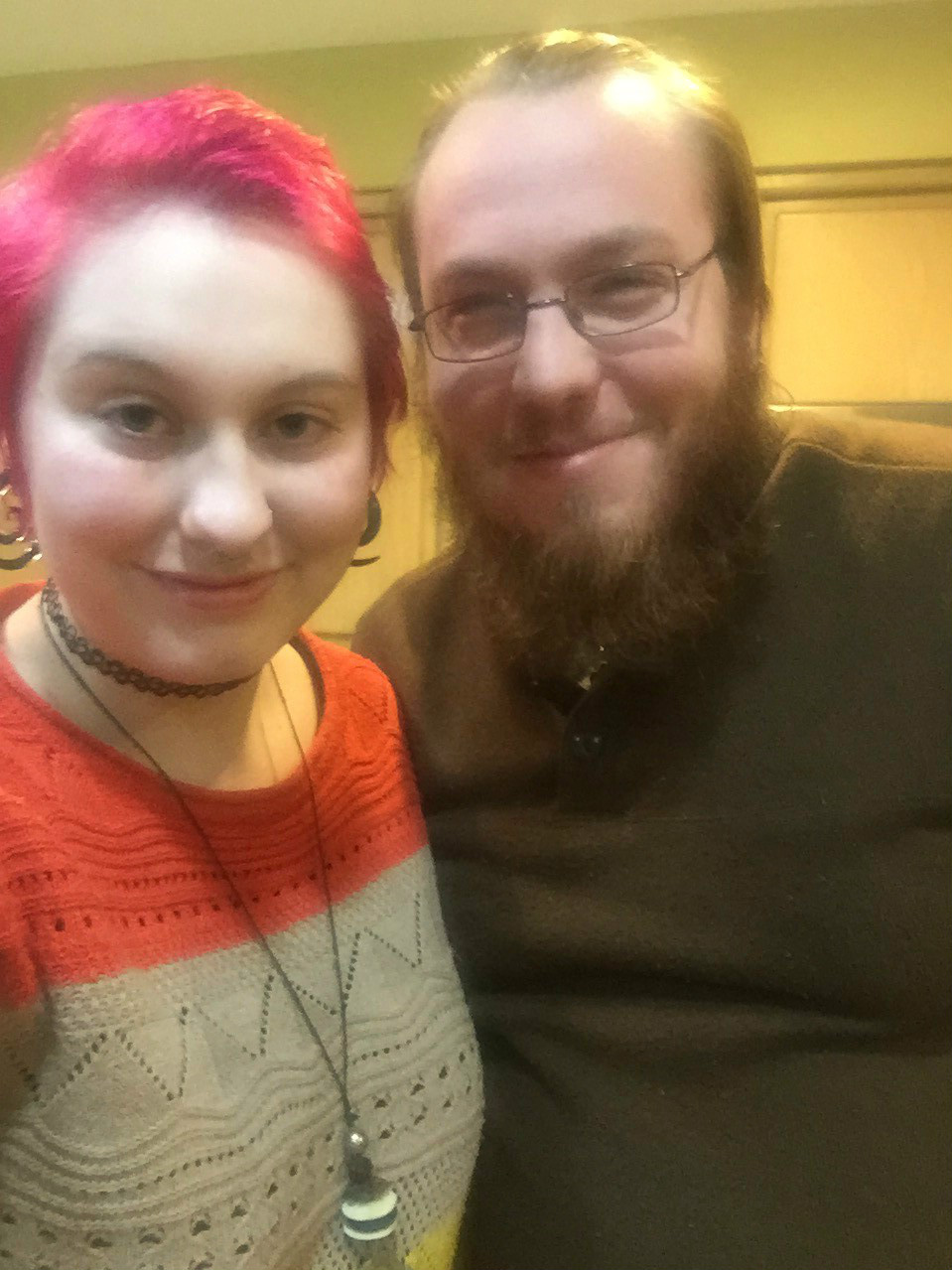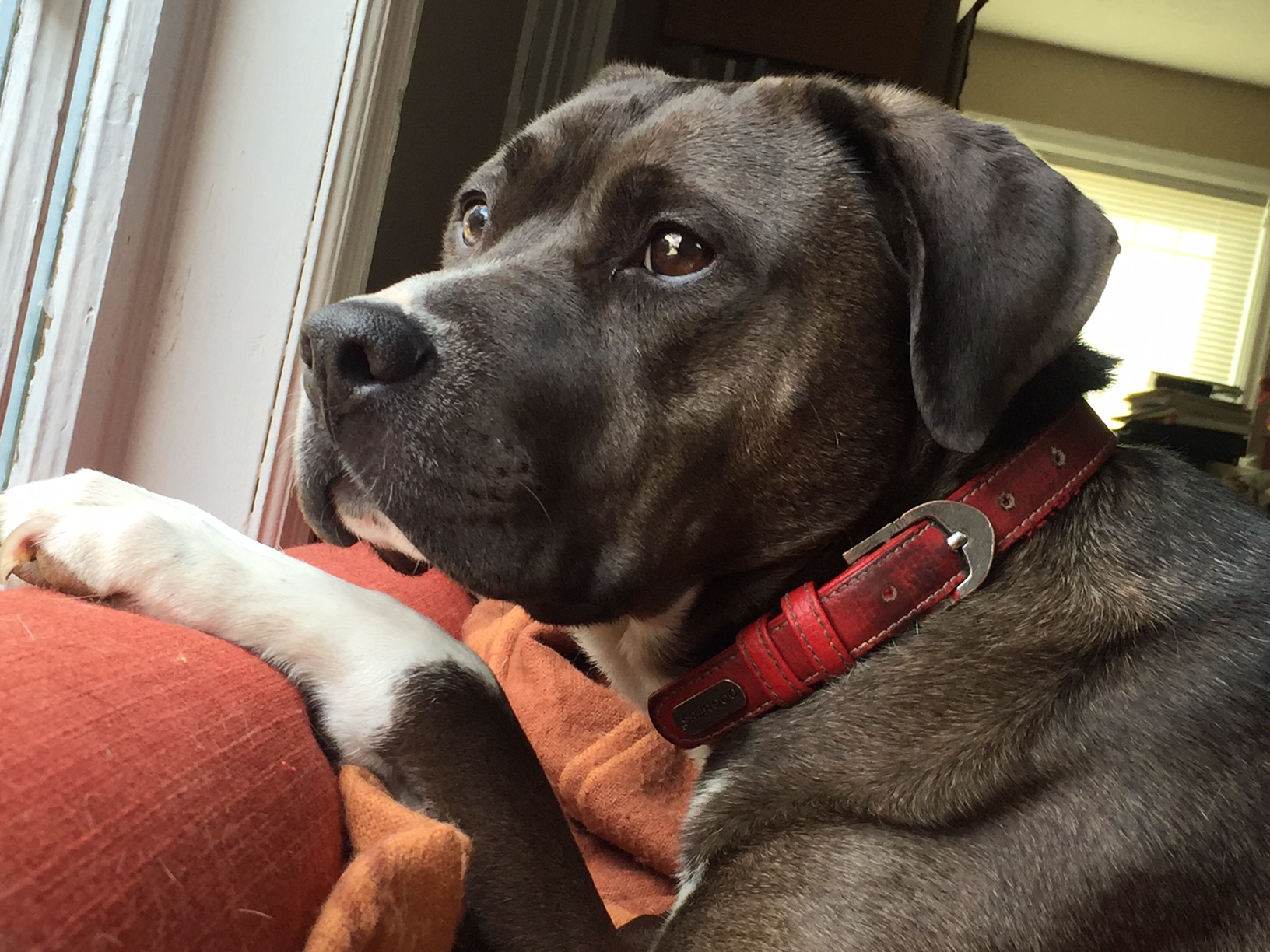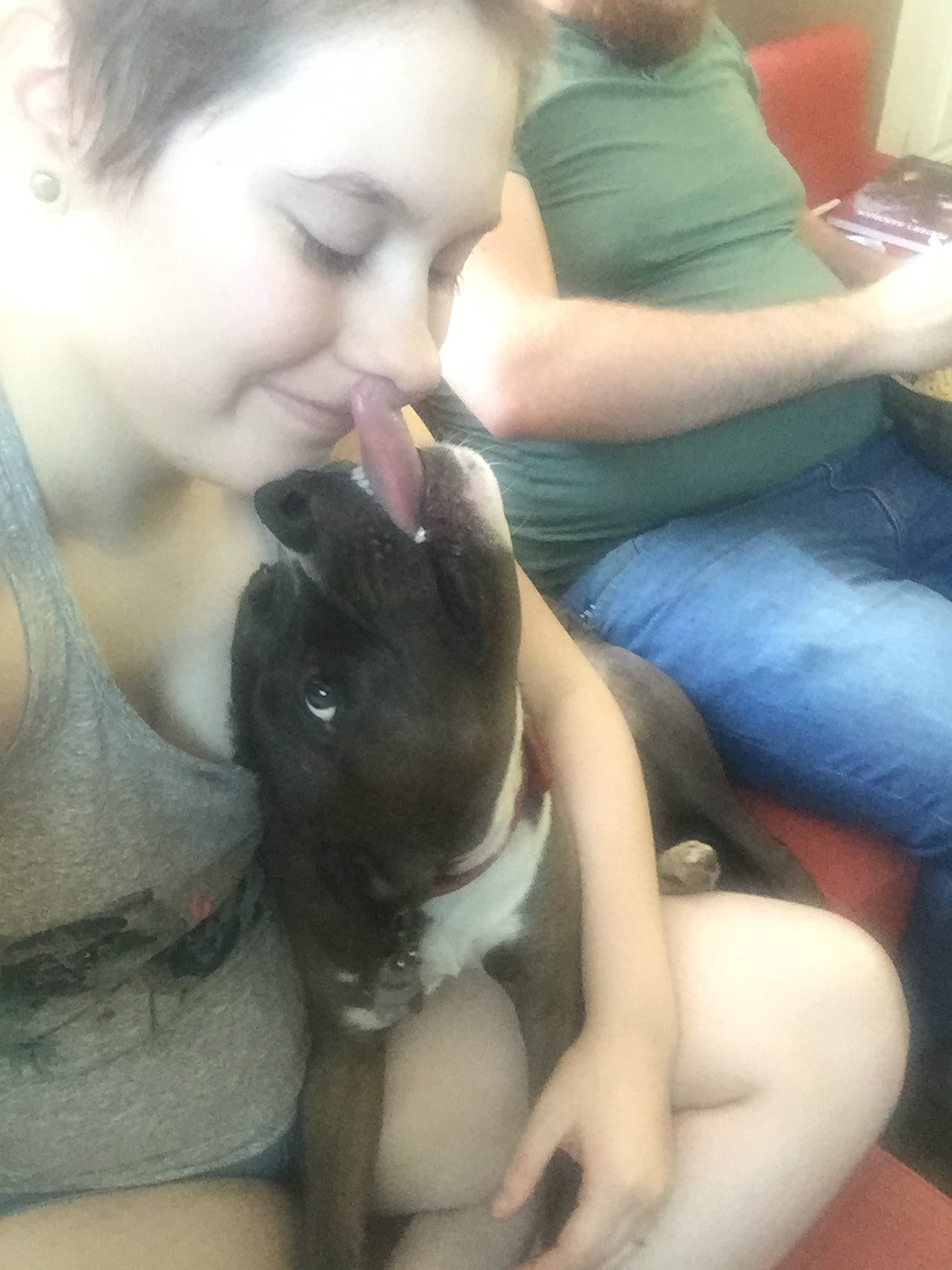
Queer Crip Love Fest: The Two Great Loves of My Life
By all accounts, I am one of those people who just needs to get a dog already. I will — will — lavish affection on every dog I encounter, whether or not I’ve met their owner before. I let a stranger’s Pit Bull/Corgi mix sit in my lap and lick my face for a good ten minutes on International Women’s Day. I’m still wondering about whether the stray I saw in my neighborhood months ago found a forever home. Current logistics and finances make pet ownership a no-go, and I refuse to adopt any dog until I know I can give it a life full of cuddling, constant attention, and great snacks. But I’m still a firm believer that there are few loves purer than that between a Dog Person and their canine pal.

So when Kaety, a 20-year-old nonbinary actor, artist, and activist, reached out to me about “the two great loves of [their] life”:
“First is my almost-four-year-old dog, Denim. I’ve had him since he was a puppy, and he had become my therapy dog. Not only does he regularly get me out of panic attacks, he helped me survive during some of my darkest hours. His rambunctious personality keeps me on my toes often, but he wouldn’t be himself without a bit of trouble.
Then there’s my fiancé, Matt. His patience and acceptance of even the most difficult parts of my life had always been absolutely natural. I lived with him through the worst parts of my illness so far, and he has always kept me grounded.”
… I knew we had to talk.
What does love mean to you?
That’s a really interesting question for me right now because I’ve had some tough family stuff go on. I’ve always had a complicated family; I don’t have many blood relatives I am close to whatsoever. So family love has come from friends as much as relatives. I’ve found that love is someone who is going to be there and understand you, even if they can’t follow everything that’s going on. Even if they don’t get every intricate part of what you’re going through, they’re still there, and they’re still gonna respect you.
A quiet, understated, but always there love makes me feel best. For me, love is positive attention with respect of my boundaries and moods. I love very deeply, and invest a lot in those I love, and sometimes that can hurt, but that’s how my heart is.
Especially since I have a chronic illness, sometimes I can’t be as affectionate with people as I want to be. Often, my skin will just be hypersensitive, and if I even just touch a hard corner of something, it hurts like a burn, almost. That’s hard for a lot of people who care about me. Sometimes I have to place really strict boundaries and be like “I can’t even hug people today, because it hurts.” That has been a problem for some people who have known me for a long time. They’re like “But this isn’t how you used to be.” And I’m like “Well, I have to preserve myself, to some extent.” It does get in the way.
So if you’re having a day where hugging is not an option, what are some other ways that you show affection?
I like being able to touch someone briefly, even if it’s just their arm or their hand. Or just sitting next to someone and actually being there with them — that means so much more to me than any of the physical stuff does, in the long run. If you’re gonna be there and spend time with me, help me distract myself from all the maintenance I have to do on my body, that’s what means the most. Sometimes it does mean just sitting on the couch talking. I can’t always go out to lunches and stuff. I can’t always drive. And so people understanding and still taking the time to be with me during that means a lot.
“Love, for me, is positive attention with respect of my boundaries and moods.”
It sounds like your fiancé does a good job with that.
He was raised by a parent who’s disabled, so his outlook on that is very unique. She home schooled him for a brief amount of time too. He is able-bodied, pretty strong, pretty able to work long hours, which is very helpful for me since I’m not able to stand on a concrete floor for nine hours a day anymore. He, fortunately, also enjoys that, so he’s been able to help us progress. We started out literally living in his parents’ home; that’s where we moved in together. And we gradually got to an apartment, and now we’re in a house, and that’s huge.
Having a safe, stable place to live where I don’t have to go up a flight of stairs or deal with noises from other people that keep me from sleeping has improved my life significantly.

It’s interesting that you bring up the division of labor, because I think a lot of people have questions and/or are skeptical when it comes to a disabled and an able-bodied person together. “What could you possibly be contributing to this relationship?” And not even just from outside — there’s the whole internal “Don’t burden this person who’s already doing all this for you!” thing. This idea that even being with you is a favor.
We haven’t had an issue with that — again, I think that’s largely because he grew up with a disabled person in his household. But he also does understand that having a disability takes work. It is sometimes a full-time job. And he understands that on days when I have energy, I get a lot done! I have pushed through and done things I definitely wasn’t able to do years ago.
How did you meet?
We actually met at community college, in our Community Chorus class.
Oh, yay! That’s so cute!
He was a music major; I was just there because I enjoy music and was like “I should probably try and make friends sometimes.” I got to know him because he was a very popular music student, so the conductor would call him out and have him do example stuff for us. So I knew his voice before I ever knew him. Which, I mean, it’s just so sappy.
Apparently he had tried to talk to me at some event, but it was somewhere that had been hard to drive to and I was a new driver, so I blew him off because I was distracted. But we ended up at an end-of-year party for the chorus and talked then. Our first date was the most recent Godzilla movie, and it was only a few months after that that we moved in together. We got along immediately.
“I was already identifying as nonbinary when we started dating. And on our second date, I came out to him… And he took it fine, which none of my previous partners had. He was just like, ‘Okay.’ And that was huge for me.”
Were you already identifying as disabled when you met him?
No. I was aware that something wasn’t right in my body, but I thought it was due to depression. I’ve always had depressive issues in some form or another. So I definitely wasn’t identifying as disabled, but I was having a large number of the issues I deal with now. It’s obviously super complicated. It was really once I started feeling real physical effects and was unable to do certain things — I ended up dropping out of college, even though I started early, because I was too sick to go to class. It was around then when I was like “This is definitely not normal anymore,” y’know? “This is not a reasonable, expected amount of pain in a lifetime.”
I know that line is so blurry; I also know that my physical and mental health issues interact a lot. Most of the time, I don’t really know where the lines are between those. Which is complicated! It’s hard when an anxiety attack will bring on a fibro flare up. Personally, I think a disability is when it starts keeping you from doing something you want to do. But that’s only based on experiences I’ve had, and it’s obviously super individual.
Especially since I was diagnosed pretty young — a lot of fibromyalgia isn’t caught until you’re closer to your forties — I couldn’t relate to the experiences of other people, who were like “Oh, this was brought on by menopause” or something. I’m like, “I’m 18 and I have this.” There are people who, when I say I have a chronic illness and try to talk about it will be like “Well, you’re just an adult now.” I mean, yes, but also, this is real. It does keep me at home a lot. I do have a weakened immune system. I’m not making this up. So it was so important that he believed me and understood.
I was already identifying as nonbinary when we started dating, though. And on our second date, I came out to him — which was a little scary, because I wasn’t as publicly presenting as I am now. I still looked pretty cis and I was vastly underweight. And he took it fine, which none of my previous partners had. He was just like, “Okay.” And that was huge for me.
“There are people who, when I say I have a chronic illness and try to talk about it, will be like ‘Well, you’re just an adult now.’ I mean, yes, but also, this is real. I’m not making this up.”
That’s so validating. So with the progression of your disability, both physically and in your understanding of it, did he take that well also?
Yes. Right after I moved in with him was when I started hitting my sickest, because I was experiencing a lot of stress and not receiving any real treatment. And I ended up dropping out of school and almost not leaving the house for three or four months. Nothing beyond going to the grocery store, if that. And that was really tough. I had just turned 18, so I was really young. And he took that so well.
He saw every day how sick I was, and how much, every day, I would want to get stuff done. He ended up getting a degree and working full-time, just working on improving skills outside of the college environment. Neither of us is a very traditional learner. But I think his parents being who they are really benefited him, and ultimately ended up working in my favor with him understanding a lot of things right off the bat.
He wants to be a bigger activist in the community. He appears very cishet, and he is cis — but he’s always been attracted to nonbinary people and just not known the term for it. Most of the people he gets along best with are trans or gay. So he’s looking to do a lot more activism. And he’s started wearing nail polish at work. Y’know, he works at Home Depot — he has a lot of conservative coworkers who think it’s okay to say shitty stuff. So he does that just to remind them.
What kind of activism do you do?
Well, I grew up right outside of D.C. — so, that is to say, with too much politics. It’s part of the reason I left. But for years I’ve done activism as just a part of my life. I started helping at polling centers as a child. I’ve been to, I think, all the inaugurations I’ve been alive for except for this most recent one. I’ve been to counter-protests for Westboro Baptist Church, and I was on the steps of the Supreme Court the day before the marriage equality vote. Activism has been a part of my life since I was born, and I can’t just ignore that as an adult.
Recently I’ve been involved with the Degenderettes, which is a queer femme activism group. A lot of activism, art, and community outreach and safety. It’s founded by trans femme people. They definitely deal with a lot of disability conversations as well. I’m the leader of the group up here, and they’ve been great.

Okay, I’ve been saving this: tell me about your dog!
He’s actually here with me right now, being a big sleepy baby. His name’s Denim. I rescued him at around four months, and they told me he was some sort of retriever, but they were very wrong. He’s actually a Catahoula Leopard Dog. It’s the Louisiana state dog, actually. And they’re known for being extremely loyal.
He got attached to me very quickly, so as a puppy anytime he was away from me he’d just destroy stuff. And he wouldn’t sleep at night. But now he’s about four years old and has been one of the best companions for me. He’s not as energetic as he used to be, but he’s such a troublemaker and the most loyal dog I’ve ever met. He’s next to me at all times he can be. He knows when I have panic attacks or when other people have panic attacks, and usually he’ll either try and crawl in your lap or start acting out and causing trouble. I know that as a cue now: if I’m showing anxiety that I might not even notice and he’s acting out, I need to evaluate how I’m feeling. He’s never been trained for it or anything; he just does it.
Right now he’s certified as a psychiatric comfort dog. I’m going to work on getting him certified as a higher-level care dog, so I can bring him to events and stuff. Because he’s amazing with people. I can take him on planes, but it’s not as easy as if I had the other certificate. Plus I want to take him to Pride and stuff like that.
“My dog knows when I have panic attacks or when other people have panic attacks, and usually he’ll either try and crawl in your lap or start acting out and causing trouble. I know that as a cue now. He’s never been trained for it or anything; he just does it.”
How has Denim helped you navigate your disability better?
He definitely knows when I’m having anxiety and over-obsessive tendencies. He can tell when I’m starting to mentally lock up, and has gotten very good at telling me that I’m doing that. He’s basically a nurse dog: he lays next to me when I’m sick and is very calm. He doesn’t get into as much trouble then. He gets me out and about, gets me to talk to people. I’ve met people who don’t like dogs who like him.
In general, it’s just the companionship. When I got him, I was alone a lot and lived in an area where I couldn’t walk to restaurants or anything. So he has been a live-in companion. And he’s got such a big personality.

You mentioned earlier not being able to show physical affection all the time, and sometimes dogs can want to jump on you just because. Has that ever become an issue?
Once in a while. He does have long nails, and since I bruise easily, I’ll just get a lot of bruises that are lines up and down. Now that we’re in a house, we spent some extra money and fenced in the yard, so that’s been good in terms of running around. We open the door and he just sprints. He’s learned to be a dog without other dogs.
He’s been such a companion, and a real lap dog since the day I met him. I sat on the ground, he came over and sat in my lap, and I was like “I guess this is my dog now.” Also, I got him right after I was diagnosed as bipolar. And so he was there all through that.
Did you face similar issues of being believed and taken seriously — which it sounds like was an issue with your fibro — with your bipolar diagnosis?
To an extreme extent, yes. I was pretty lucky to get diagnosed early at 16. But I faced some pushback from my therapist at the time. And I would have friends’ parents tell me they didn’t believe in me taking meds. I would tell them “I probably would be dead without these,” and they’re still like “You’re too young for that.”
I get that we don’t want to start “too early,” but sometimes it is necessary. And that needs to be understood. It was bizarre — and because I was still considered a child, people would feel comfortable saying things like that to my face. But even at that age, I wasn’t having it. And because my mom started taking medication for depression when I was young, she understood that they have life-saving properties. That was lucky.
I was very fortunate to hear about fibromyalgia and get my diagnosis as early as I did. Both of my parents believed me, which was convenient, and I already knew what to do. So I was really well prepared, and I’ve helped a lot of other friends with chronic pain start to address and understand that, as a young person, you shouldn’t have constant pain. That’s not addressed enough! And it’s definitely a thing. So I do that in the community a bunch and I want to do more.
It’s such a complicated thing because there isn’t really one answer — as with many chronic illnesses. There’s never just one answer.